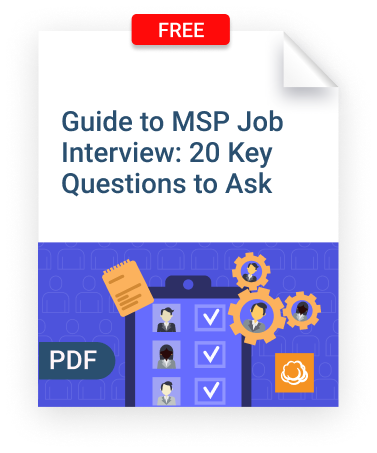MSP Business
Guide to Managing Your MSP Sales Team
If your MSP business is good at what it does, then expect growth to come naturally. And while that would be a great thing overall, increased growth also happens to attract its fair share of challenges.
Now, at the center of the whole expansion process is sales. Every growing MSP company ultimately reaches that point where a dedicated sales department becomes a necessity.
But, here’s the rub. MSPs are all about IT services, and they are not necessarily cut out for the world of sales and marketing. So, of course, you might have to bring in real sales professionals, and then figure out ways of managing their operations.
That might sound cumbersome, but it really isn’t. MSP sales management is, by and large, pretty simple if you follow these guidelines.
The Right Time to Start Hiring Salespeople
 Although your company’s growth depends considerably on the sales volume, you might want to hold off hiring salespeople until later. Not for long though. Because too much growth would only complicate things further.
Although your company’s growth depends considerably on the sales volume, you might want to hold off hiring salespeople until later. Not for long though. Because too much growth would only complicate things further.
That said, sales agents should essentially come after you’ve already set up a solid team of IT professionals. Always keep in mind that managed services are the core business here. And that basically makes the IT your only priority until the company is increasingly overwhelmed by leads.
Further reading Think You’re Ready To Hire Your First Employee?

Securing the Best Sales Talents for Your MSP
 Sales is a tricky job. Only a professional with specialized skills and some form of social finesse is capable of maintaining a positive sales growth curve.
Sales is a tricky job. Only a professional with specialized skills and some form of social finesse is capable of maintaining a positive sales growth curve.
Now, to secure such individuals for your company, use this systematic hiring methodology:
1. Come up with an explicitly-detailed job description.
2. Find a perfect balance between a salesperson’s experience and their corresponding compensation. And if you’d prefer a compensation structure based on recurring revenue deals, you could proceed with either an Annual Contract Value, Total Contract Value, or Monthly Recurring Revenue. The choice is yours.
3. Seek recommendations for outstanding sales professionals from your network.
4. Interview every single candidate separately but extensively. And in addition to their professional backgrounds, you should keenly evaluate how they handle challenges, how motivated they are, as well as their individual interpersonal skills, willingness to learn, plus overall competitiveness.
5. Offer each successful candidate an appropriate compensation package, and then give them ample time (about a week or so) to think about it. That said, it would be wise to quote flexible figures since some candidates may want to negotiate further.
6. After your offer has been accepted, each hired individual should first undergo a brief trial period to assess their competency levels. That means singing two different contracts- a temporary one for the trial period, followed by a standard employment contract as they finally transition to permanent status.
Converting IT Workers into Sales Experts
 Let’s face it. Hiring a team of dedicated sales professionals might not be possible for all MSP companies.
Let’s face it. Hiring a team of dedicated sales professionals might not be possible for all MSP companies.
But, make no mistake about it. You can still have an in-house MSP sales team without necessarily hiring new employees. The trick is to get them from your current IT department.
Although IT and sales are two completely different fields, combining them would make a perfect blend for an MSP company. And the good thing is, even staff members who’ve never tried it out before can be assimilated into sales. You just need well-rounded IT professionals with great interpersonal skills.
Sales Process Documentation
 Whichever system you use to set up a company sales team, the overall objective is pretty straightforward. You essentially seek to sell more and sell faster.
Whichever system you use to set up a company sales team, the overall objective is pretty straightforward. You essentially seek to sell more and sell faster.
Now, there are multiple strategies you could possibly use. And one of the most effective ones entails documenting the entire sales process.
The goal here is to streamline everything accordingly by applying a standard but a proven framework of pursuing leads. This would require you to document every single sales step you’d want your team to maintain, as well as the accompanying set of sales tools.
That said, a well-detailed document simplifies MSP sales management for everyone through repeatable activities. You’ll also find it to be extremely handy when you need future sales projections for critical decision making, as well as scaling your sales team.
Sales Metrics
 The sales process is largely about numbers and there’s a wide range of variables that MSP businesses can possibly track. However, to judge the subsequent results accordingly, you should narrow the metrics down to the few that matter.
The sales process is largely about numbers and there’s a wide range of variables that MSP businesses can possibly track. However, to judge the subsequent results accordingly, you should narrow the metrics down to the few that matter.
These, in other words, are collectively called Key Performance Indicators (KPIs) and they are usually established based on a company’s specific sales goals.
Some of the KPIs you could use to analyze your sales progress include:
- The volume of sales emails or phone calls over a certain time frame.
- The frequency of sales meetings.
- The rate and volume of service quotes.
- Monthly Recurrent Revenue numbers.
- The rate of positive sales closings.
- The cumulative amount of revenue collected from all clients over a specific time frame.
- The company’s overall net revenue.
Further reading Guide to MSP Sales Critical Metrics
Sharpening Your Salespeople’s Skills
 Newbies, as well as seasoned salespeople, need some form of training to progressively sharpen their skills. This helps them convert their leads more effectively while holistically adapting to the ever-changing market needs.
Newbies, as well as seasoned salespeople, need some form of training to progressively sharpen their skills. This helps them convert their leads more effectively while holistically adapting to the ever-changing market needs.
So, you should consider setting up a solid training and mentorship program for your sales employees. It could, for instance, involve catching up with the company’s new service offerings after every couple of months.
It’s also important to encourage social interactions between your company’s employees. This would help salespeople learn a thing or two about MSP services from their IT colleagues.
Further reading MSP Employee Retention Guide
Sales Briefings
 Have sales briefings every week with the entire team to review their progress and provide new updates. Morning hours on Friday or Monday are particularly ideal for such meetings.
Have sales briefings every week with the entire team to review their progress and provide new updates. Morning hours on Friday or Monday are particularly ideal for such meetings.
All in all, an hour would be enough for a typical assessment of their individual performances, any developing sales prospect, and the corresponding sales goals. You can even go ahead and squeeze in discussions about various sales tactics.
Conclusion
In essence, managing salespeople is a continuous process. It should never stop even when you’re dealing with converted IT employees. So, in a nutshell, maintain a consistent sales framework, apply KPIs throughout, and keep your salespeople in the loop at all times.



